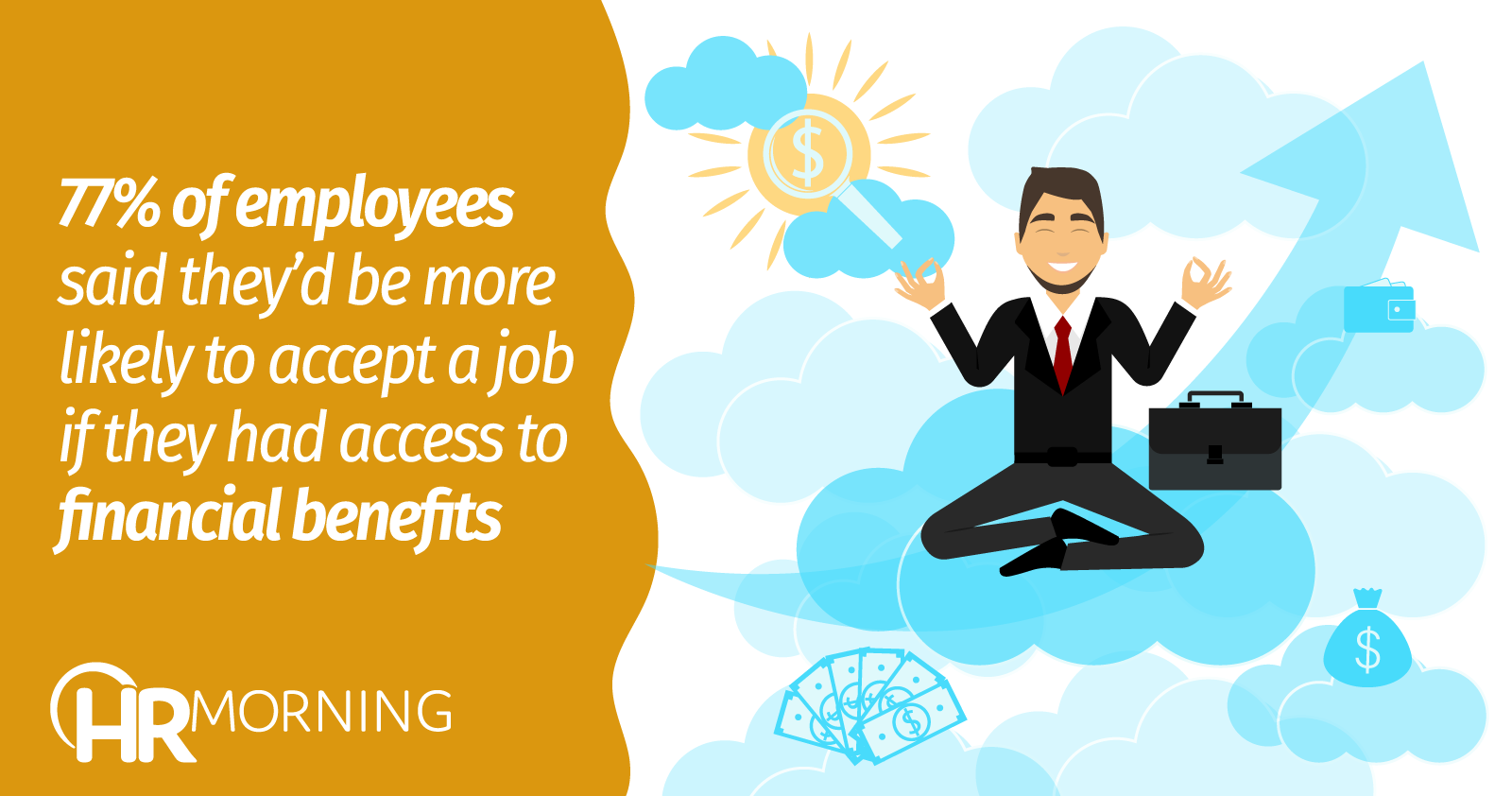Thanks to the pandemic, people are hyper-focused on their physical and mental well-being. However, they’re also laser-focused on their financial well-being.
Why?
Because it’s stressing them out.
And with people jumping ship left and right for higher paying and better jobs, what can you do?
Well, like most companies surviving a pandemic, you probably don’t have a ton of money to throw around. Instead, try offering programs that’ll help employees with their financial well-being.
Employees want help
Employees are more receptive now than ever to getting help with their finances. They want advice on retirement planning and investing, according to a John Hancock survey. They see financial wellness programs as an essential benefit. And if companies don’t offer them, they’ll go elsewhere.
Believe it or not, 69% of employees say their employer doesn’t offer any financial well-being support/benefits. Yet, 57% said they would like to have them. And 62% believe it’s an employers’ responsibility to provide them. That’s according to a survey by Alegeus, a consumer healthcare funding company.
The survey polled 1,000 consumers to gather their perceptions around financial benefits.
And guess what? Seventy-seven percent said they would be more likely to accept a job offer if they had access to financial benefits. So, offering such benefits is a major key to attracting and retaining employees.
“I’m not surprised by these numbers, but I do expect it to change significantly in the coming years,” said Leif O’Leary, CEO of Alegeus. “Employees are beginning to demand these types of benefits. And employers are quickly realizing they’re a great tool to attract and retain talent in a very competitive job market.”
Personalized, supportive benefits
Traditional benefits aren’t going to cut it anymore. People want employers who truly care about their well-being. They want benefits that are personalized and supportive. And they want financial wellness to be a part of their benefits package.
An effective financial well-being benefits package integrates education, coaching, counseling and workshops, according to Enrich, a company that offers tailored financial wellness programs.
A large majority of employees are stressed about money! Stressed employees can’t focus on their jobs. If you educate them on how to handle their money better, they’ll be less stressed and more productive.
Financial benefits formula
To offer well-rounded educational benefits, Enrich’s formula is to include one of the first four benefits below, mixed in with five through 31:
1. Interactive, adaptive, customizable, digital financial education on topics like budgeting, emergency savings, identity theft, etc.
2. Financial coaching via phone or online chat
3. Financial counseling via phone or online chat that provides employees with guidance on specific topics
4. Financial education workshops (Look to financial advisors or credit unions as possible sources.)
5. Financial planning (While this wouldn’t appeal to all employees, it’s meant to target executives. Just make sure you use certified financial planners.)
6. Credit and debt counseling
7. Student loan counseling
8. Financial aid help (especially for first-time, college-student parents)
Employer matching
Another aspect of financial well-being benefits is offering employer matching benefits. In fact, Enrich found that 75% of new hires want 401(k)s. The other 25% are probably young people who are busy paying off their student loan debt (see #7). By providing younger employees with student loan counseling and help with repayment (see #9), you’re freeing up part of their budget to contribute to your 401(k).
Not only is providing a 401(k) an attraction tool, it’s also a big retention tool. And let’s not forget, firms who provide a matching program get tax benefits.
But there are other things to consider with 401(k)s:
9. Sidecar savings matching. This type of savings account is tied to retirement savings. It gives employees the ability to save after-tax contribution, as well as save for retirement – but only for a short period of time. The benefit to providing a sidecar savings match: Employees reach their savings goal faster and can fully participate in retirement savings.
10. Student loan repayment contribution. This is a benefit many employees want – and need. There are a few kinds: matching the loan repayment to pay down the loan directly and matching to a retirement fund to allow employees to start a retirement account while paying back their student loans.
11. 529 contributions to college savings plans (Remember, money contributed by firms to these plans is taxable.)
Voluntary benefits
Health, dental and vision benefits are expected by most employees. Now, they want more!
They want and believe firms should offer a variety of voluntary insurance benefits to meet their personal needs, such as:
12. Life insurance
13. Pet insurance
14. Disability insurance
15. Adoption and fertility insurance
16. Gender reassignment insurance
17. Long-term care insurance
18. Critical illness insurance
19. Hospital indemnity insurance
And the list goes on!
Financial assistance
It’s also recommended that to really cover an employees’ financial well-being firms need to offer financial assistance, such as:
20. Tuition reimbursement (Typically, this is dependent on course completion and grades.)
21. Professional development stipend (An allotted amount of money for continuing education related to the employee’s job.)
22. Commuting assistance (This is a biggie now that many people are used to working at home and are being asked to come to back to an office.)
23. Relocation assistance
24. Short-term loans or paycheck advances (both keep employees from getting high-interest loans)
25. Health savings accounts and flexible spending accounts: (HSAs and FSAs help employees with out-of-pocket healthcare expenses, but you must educate them on how to use them and what’s covered under them or they won’t use them properly or at all.)
26. Company stock options
Employee assistance programs
EAPs help employees fix problems that can cause them stress and direct their attention someplace other than work.
27. Credit score monitoring
28. Identity theft protection
29. Dependent care assistance (29-31 are big stress relievers due to COVID-19.)
30. Eldercare assistance
31. Childcare assistance
No one company can provide all these financial wellness benefits. But you know it’s important to research most of what’s out there that can help your employees work as stress free as possible.
Having your finger on the pulse of what employees want and need, will help you put together a package that will help you attract and retain employees.



